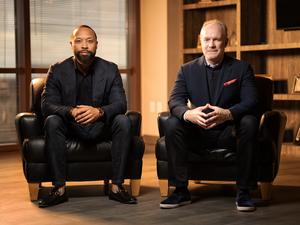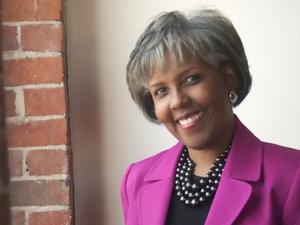
Some of the nation’s top technology companies have one thing in common — they turn to Atlanta-based Yardstick Management for diversity and inclusion consulting.
Netflix, Facebook, Amazon, Panasonic and LinkedIn are all clients of the 25-person, Black-owned consulting firm, which helps companies enact diversity and inclusion strategies to hire, retain and support people of color.
With the help of Yardstick, Netflix poured $100 million into Black banks during last year’s social justice protests.
“We’re seeing that the needle is changing because of the work that we’re doing,” said Ebbie Parsons, Yardstick’s managing partner and founder.
Yardstick, self-funded and founded in 2012, now has more than 60 clients seeking its advice. It has a 400% year-over-year revenue growth and connected clients with about 300 C-level executives of color, according to its website.
Studies show companies with more diversity have higher profitability and outperform their counterparts in innovation and revenue. A push for more company diversity, which has skyrocketed since last summer’s protests sparked by the police killing of George Floyd, has created a technical renaissance in Atlanta.
More companies, including Microsoft and Airbnb, are setting up offices or headquarters in the city, citing the diverse talent pool as a main attraction. The Georgia Institute of Technology is a leader in graduating minority engineers, and Atlanta is home to top historically Black colleges and universities, which are receiving considerable investments in their tech and entrepreneurship programs.
Yardstick helps these companies recruit that diverse talent and elevate people of color and women to leadership roles.
Without diverse leaders, tech companies could create both software and hardware tools that have programmed biases. For example, artificial intelligence unfairly ruling out qualified people in application processes or virtual reality goggles not fitting over natural Black hair.
“If you don’t have diverse developers, if you don’t have people from all walks of life who understand experiences of marginalized people, they [tech companies] implement tools that replicate and scale bias,” Parsons said.
Parsons started the firm because he felt corporate culture needed a revamp. When he worked at American Express as an investment strategist, he didn’t see anyone else in the room who looked like him. Parsons first turned to the education sector to close that gap but felt like he could make more of a difference in company hiring.
“The root of the problem is internal bias inside these corporations,” Parsons said.
Yardstick has a steady stream of clients coming to the consulting firm hoping to change their company demographics, but Parsons only chooses to work with them if he feels they believe in diverse talent. Atlanta's Inspire Brands, which has more than 650,000 employees and owns 32,000 restaurants, is also a client.
“If their efforts are performative, we don’t work with them,” Parsons said.
After last summer’s protests, Yardstick saw a huge jump in clients — going from about 20 a year to the current 60. Parsons hopes to double his employee count in the next year.
The company is also building out the Yardstick Institute, a three-to-five-day conference for corporate development to teach inclusive culture hosted in St. Simons Island off the Georgia coast, which is rich with Black history, Parsons said. That conference is set to launch in spring 2022.







